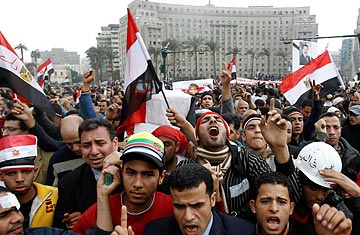
Egyptian demonstrators hold a symbolic funeral in Cairo on Feb. 7, 2011, for journalist Ahmed Mohammed Mahmoud, who was killed during clashes with pro-government supporters
The air of permanence that has begun to surround the Tahrir Square protest camp in Cairo underscores the stalemate in the Egyptian political standoff. While the democracy protesters show no signs of ceding this symbolic public space, they have not managed to dislodge the regime — and it's difficult to avoid the conclusion that the state has reconstituted its authority, albeit one that is diminished and more dependent than ever on the armed forces.
The army's attempts to shrink the space occupied by the protesters on the square have prompted row upon row of human barricades that are stationed to surround the tanks, preventing any further encroachment without causing many casualties. But elsewhere in the city and beyond, there has been a resumption of the everyday routines that were disrupted by the unprecedented challenge to President Hosni Mubarak on the streets. The regime appears to have adjusted itself to a daily outpouring of civil disobedience and dissent, which would not have been tolerated three weeks ago, and seems intent on playing for time and testing the endurance of this inchoate movement.
One of the great strengths of the protest movement has been the diversity of its ranks, but the regime is clearly trying to exploit the absence of a united organizational leadership by engaging in talks with various opposition elements, offering only minor concessions, while hoping to find enough takers to eventually isolate those in Tahrir Square who reject negotiations as long as Mubarak remains in power. The core element in the protest camp opposed the talks conducted on Sunday between Vice President Omar Suleiman and opposition elements over the terms of a transition. And divisions are becoming more apparent as it becomes clear that the regime is unlikely to collapse in the way that Tunisia's did last month.
On Sunday night, for example, several youth activists began distributing a leaflet detailing possible scenarios for amending the constitution to allow for a democratic transition. Unsure of the document's contents, a group quickly surrounded the activists, perused the material, and accused them of being infiltrators from the ruling National Democratic Party — the source of the group's suspicion was the fact that the leaflet recognized that the current constitution requires presidential authority for any amendment. It's precisely this sort of division over the terms of a democratic transition that Suleiman and his cohorts are actively exploiting in the hopes of ending the rebellion.
While their momentum has shifted numerous times, it is unclear now how the protesters can regain the initiative. The pace of protest will no doubt be tempered, with a shift to large demonstrations on Tuesdays and Fridays. There is no reason to doubt that the protest movement can continue to bring huge crowds onto the streets, but such shows of strength are unlikely to have the same effect as the initial demonstrations, whose unprecedented scale shocked the regime and punctured its legitimacy. Now, however, the regime may be able to live with quite a few more weeks of biweekly demonstrations.
The stalemate on the square is in no small way a product of the military's patience and willingness to protect the protesters from attack. At the same time, the army has had to oversee policing duties amid the disarray of the internal security forces. But the military's interests are not the same as those of the protesters, nor necessarily as those of the Mubarak family. Besides protecting its core institutional interests (which include maintaining its $1.3 billion annual stipend from the U.S.), the military's priority is maintaining the stability of the state. The effect of the democratic uprising has been to make the military the key power base in the state, and if the regime is unable to secure an orderly transition through negotiations with opposition groups, the armed forces might be tempted to take charge of the transition themselves — further clouding the prospects for significant reform.
Three nights ago, an army colonel overseeing a checkpoint in Cairo where I had been stopped took me aside for a furtive but remarkably frank conversation about Egypt's political crisis. The colonel was blunt in his criticism of the police and regime-backed thugs who attacked the demonstrators and left no doubt of his sympathy for the demonstrators' demand for Mubarak to go. But, he warned, the military would not violate orders in order to protect the protests, nor would it press for the changes demanded by the demonstrators if they were not able to force the regime's hand.
The military leadership, the colonel made clear, is not sympathetic to the continuation of the protest movement; it seeks a restoration of normalcy so that the troops can return to their barracks. The military, as he described it, is a conservative institution, and like much of Egyptian society, it seeks stability rather than upheaval.
But with those on the streets unlikely to accept the limited changes being offered by the regime, the coming weeks are likely to see a messy, protracted series of negotiations and protest actions in which neither side is willing to concede.
And that's exactly what worries the colonel, who shared his concerns with me out of earshot of the men manning the checkpoint. He fervently hopes to see a political compromise before the army leadership orders its troops to clear the streets. And while this action might seem unlikely based on the army's current posture, the colonel fears that if the order came to act against the protest movement, his men would follow it — but the bonds that define his beloved institution would never be the same.
Michael Wahid Hanna is a fellow at the Century Foundation in Washington.
